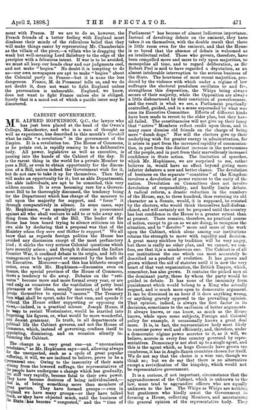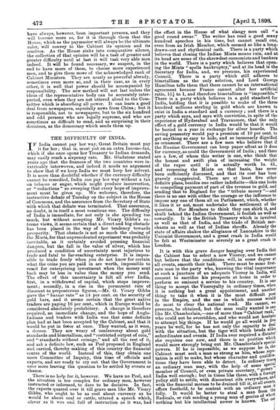CABINET GOVERNMENT.
MR. ALFRED HOPKINSON, Q.C., the lawyer who has just been placed at the head of the Owen's College, Manchester, and who is a man of thought as well as experience, has described in this month's Cornhill what he calls "a revolution" in the government of the Empire. It is a. revolution too. The House of Commons, as he points out, is rapidly ceasing to be a deliberative body. All power, legislative as well as executive, is passing into the hands of the Cabinet of the day. It is the rarest thing in the world for a private Member to pass a Bill, or even to obtain opportunity for the discus- sion of a Bill, unless indeed the Government wish for it, but do not care to take it up for themselves. Then they will make an opportunity for it; but as able Departments, like able individuals, are apt to be conceited, this very seldom occurs. It is even becoming rare for a Govern- ment Bill to be thoroughly discussed, the tendency being, for the Department which has charge of the measure to call upon the majority for support, and " force " it through comparatively in silence. In some cases, says Mr. Hopkinson, "an apocalyptic curse is pronounced against all who shall venture to add to or take away any- thing from the words of the Bill. The leader of the House has been heard trying to silence criticism on his own side by declaring that a proposal was that of the Ministry whom they were sent thither to support." We all know that as regards foreign politics the House has avoided any discussion except of the most perfunctory kind ; it shirks the very serious Colonial questions which have recently arisen ; and though it discussed the Indian Frontier War, it confined debate to its origin, and left its management to be approved or censured by the heads of the Executive. Moreover—and this has hitherto escaped notice, even with Mr. Hopkinson—discussion even on finance, the special province of the House of Commons, shows a tendency to die away. Debates on the " esti- mates " become more and more formal every year, or are used only as occasions for the ventilation of petty local grievances or the ideas, usually incorrect, of those who devote themselves to special "causes." The Treasury fixes 'what Wean be spent, asks for that sum, and spends it without the House either supporting or opposing its views,—indeed, in a practical silence. Joseph Hume, if he were to revisit Westminster, would be startled into forgetting his figures, or, what would be more wonderful, into decent grammar. In truth, in all departments of Political life the Cabinet governs, and not the House of Commons, which, instead of governing, confines itself to appointing, dismissing, and on occasion silently in- fluencing the Cabinet.
The change is a very great one—an "unconscious revolution," as Mr. Hopkinson says—and, allowing always for the unexpected, such as a cycle of great popular , Buffering, it will, we are inclined to believe, prove to be a !Permanent one. Owing to the insecurity of their seats arising from the lowered suffrage, the representatives of he people have undergone a ehange which has gradually, nt still very rapidly, become fatal to their own power. uey have become desirous of being individualised,— ttat is, of being something more than members of treat arties. They have formed groups — even in Dean we have many groups—or they have talked or they have objected much, until the business of the State has become " congested," and the "time of Parliament" has become of almost ludicrous importance. Instead of devolving debate on the eminent, they have taken it on themselves, with the double result that there is little room even for the eminent, and that the House is so bored that the absence of debate is welcomed as an intellectual relief. Those who govern, therefore, have been compelled more and more to rely upon majorities, tc, monopolise all time, and to regard deliberation, as Sir Robert Peel is said to have regarded a deputation, as an almost intolerable interruption to the serious business of the State. The heaviness of most recent majorities, pro- duced by the violence with which under a regime of low suffrages the electoral pendulum oscillates to and fro, strengthens this disposition, the Whips being always secure of their majority, while the Opposition are always a little disheartened by their conviction of powerlessness, and the result is what we see, a Parliament practically controlled, guided, and in a sense superseded by what was once its Executive Committee. Efforts of different kinds have been made to revert to the older plan, but they have all failed. The constituencies will not give up their fancy that "active" Members reflect credit upon them, and in many cases dismiss old friends on the charge of being mere " dumb dogs." Nor will the electors give up their underlying wish for greater energy in administration, for it arises in part from the increased rapidity of communica- tion, in part from the distinct increase in the nervousness of the people, and in part from their marvellously increased confidence in State action. The limitation of speeches, which Mr. Hopkinson, we are surprised to see, rather believes in, would have no effect beyond giving more inferior debaters a new and better chance. The devolution of business on the separate " countries " of the Kingdom involves a devolution of power ruinous to the unity of the nation. Devolution on Committees does not involve devolution of responsibility, and hardly limits debate- A radical reform, a drastic reduction in the numbers of the House, say, to three hundred, thus restoring its old character as a Senate, would, it is supposed, be resisted by the electors, who would think themselves half-disfran- chised, and will certainly not be proposed until the country has lost confidence in the House to a greater extent than at present. There remains, therefore, no practical course of action, except to go on as we are doing, to recognise the situation, and to " devolve " more and more of the work upon the Cabinet, which alone among our institutions retains the strength to move with rapidity and decision. A great many sticklers by tradition will be very angry, but there is really no other plan, and we cannot, we con- fess, see that it.is a mischievous one. The Cabinet is of all our institutions the one which can most accurately be described as a product of evolution. It has grown and grown without the aid of statutes until it is now the very heart of that vast organisation, the British Empire, which, remember, has also grown. It contains the picked men of. the dominant party, those by whom the party would be guided in debate. It has none of the immunity from punishment which would belong to a King who actually reigned, and is much more open to democratic argument. It can be dismissed in an hour if it does anything wrong, or anything gravely opposed to the prevailing opinion. That opinion, indeed, is always the first factor in its decisions, sometimes to the exclusion of better arguments. It always knows, or can know, as much as the House knows, while upon some subjects, Foreign and Colonial policy for example, it occasionally knows a great deal more. It is, in fact, the representative body most likely to exercise power well and efficiently, and, therefore, ,under a democratic regime power accretes to it, as it will, we believe, accrete in every free country governed by repre- sentatives. Democracy is not shut up to a single agent, and this is the agent which, as huge Councils have grown too cumbrous, it has in Anglo-Saxon countries chosen for itself. We do not say that the choice is a wise one, though we think so; but we do say that there is no alternative except a. revivification of the kingship, which would not be representative government.
It is a curious, if not important, circumstance that the- aggrandisement of the Cabinet, which is unknown to the law, must tend to aggrandise officers who are equally unknown to the law. The Whips as Whips are nothing but gentlemen who kindly assist the Government in forming a House, collecting Members, and ascertaining the general opinion of the representative body. They have always, however, been important persons, and they will become more so, for it is through them that the House, which as the paymaster will always be the ultimate ruler, will convey to the Cabinet its opinion and its resolves. As the House sinks into comparative silence, the collection of that opinion will be a task of greater and greater difficulty until at last it will task very able men indeed. It will be found necessary, we suspect, in the end to have more of them, to choose more experienced men, and to give them more of the acknowledged rank of Cabinet Ministers. They are nearly as powerful already, sometimes even more so, and in their case, as in every other, it is well that power should be accompanied by responsibility. The new method will not last unless the ideas of the representative body can be accurately inter- preted, even when they are not uttered aloud to the Com- mittee which is absorbing all power. It can learn a good deal from newspapers, especially news from China ; but it is responsible, not to newspapers, but to the six hundred and odd persons who are legally supreme, and who are sometimes as difficult to read, and as surprising in their decisions, as the democracy which sends them up.



































 Previous page
Previous page